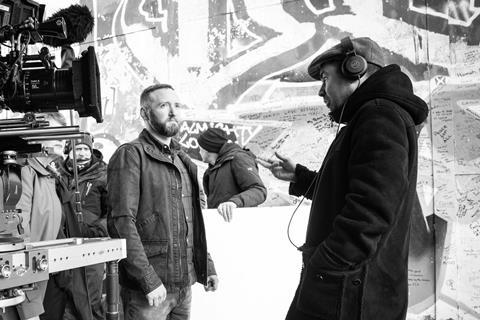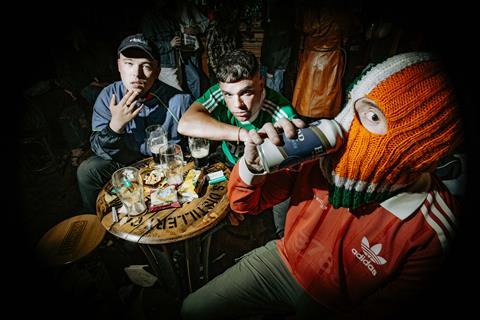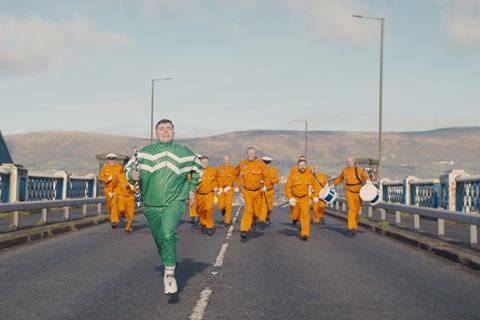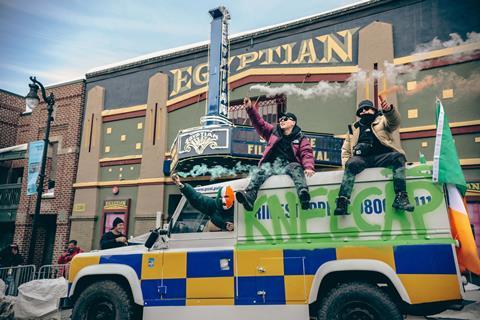Kneecap is the explosive hit of this year’s Baftas. Writer/director Rich Peppiatt and the band’s JJ Ó Dochartaigh discuss eight memorable events in the creation and release of the film.

Irish-language hip-hop trio Kneecap have broken most of the rules when it comes to being a serious awards season contender. Yet the quasi-autobiographical biopic of the Belfast band — whose members have no prior professional acting experience, or verbal filter — has scored six Bafta nominations, including outstanding British film, British debut and film not in the English language; seven wins at the British Independent Film Awards; a host of festival accolades following its Sundance 2024 world premiere; and reached the Academy Awards’ shortlist stage for best international feature and original song.
England-born, Belfast-based Rich Peppiatt makes his feature debut directing band members Mo Chara, Móglaí Bap and DJ Próvaí — who play themselves and have joint story credit with the filmmaker, together earning a Bafta nomination for original screenplay.
Delivering a comedic film that does not shy away from the band’s politics on British rule in Northern Ireland or penchant for taking recreational drugs, Kneecap was a hit with audiences, taking $2.8m (£2.2m) in the UK and Ireland during its summer 2024 release for Curzon and Wildcard, plus $1m in the US for Sony Pictures Classics. Producers are Belfast’s Fine Point Films and the UK’s Mother Tongues, with Ireland’s Wildcard co-producing. Funders include the BFI, Screen Ireland, Northern Ireland Screen and Great Point Media.
Peppiatt and school teacher-turned-band member JJ Ó Dochartaigh (aka DJ Próvaí) — wearing his trademark Irish-flag balaclava — sat down with Screen International to talk through eight key events from the film’s punk-style production and its release.
Peppiatt seducing the band using Guinness and Ireland’s largest pizza
JJ Ó Dochartaigh: Obviously the Irish are sceptical about the English making profits off Irish labour, but as soon as we got chatting to Rich we knew he was the sort of man we wanted to tell our story. The fact he was English was kind of beneficial as well. Had it been an Irishman or someone from the local area coming in, they would already have some kind of tinge on it, historically knowing the area and history of the place. Rich was very open — the script he came with was brilliant and that’s what drew us in. And he fed us full of Guinness and Beamish.
Rich Peppiatt: I would buy Ireland’s largest pizza for our writing sessions: 50 inch. I had to strap the pizza to the top of the car.
For the first six or nine months, we were literally just hanging out, sitting in pubs, drinking and getting to know each other. There are the stories people will tell you in an interview setting, there are the stories people will tell you after three pints and there are the stories people will tell you after 15 pints at six in the morning. I needed the 15-pint, six‑in-the-morning stories. There was a lot of me rocking in at 7am on a Tuesday and my wife being like, “Where the fuck have you been?”
One of the motivations of moving to Belfast was to calm down my party lifestyle. I was living in London, just had my first kid and was leading the life of someone five years younger than me. We moved to Belfast [where Peppiatt’s wife is originally from] for more of a structured life — and within two weeks I met Kneecap, the biggest caners in Belfast.

Apprehensive funders agreeing to scenes of the band enjoying recreational drugs
Peppiatt: There was pushback on the drugs. It was seen as potentially irresponsible — you can’t not show the negative consequences of drink and drugs. My argument is, well, why? Not every story that involves drink and drugs should have to hit the cliché beat of someone going to rehab or losing their marriage.
The film isn’t about drugs, it’s not Trainspotting. It’s a film that happens to have three main characters that recreationally do take drugs. It was important to keep the authenticity of the story. And it’s part of the black comedy — despite the hedonistic lifestyle they’re leading they become figureheads of this movement, even though they aren’t trying to. How did we stop the funders from [cutting it]? Just to say no. I was pretty firm trying to defend the trench when it came to the creative stuff.
Ó Dochartaigh: A lot of it [drug-taking in films] can come off as contrived. We’ve nailed it; practice makes perfect. Everything had to be authentic.
Peppiatt: The lads pitched to me, “The drug scenes: shall we just do the drugs?” I thought, “Hmm, I’m kind of up for that in the spirit of what we’re doing.” Then I talked to production and they said, “No, 110%, do not let them do drugs. There cannot be drugs anywhere on set.” That’s one battle I let go. They did so much glucose powder they’ve all got diabetes.
Ó Dochartaigh: There was also a lot of pushback [from funders] on the Brighton hotel joke [“I’m going to blow you like a Brighton hotel”] and the Bobby Sands joke [Móglaí Bap’s missing father, played by Michael Fassbender, is a republican who fakes his own death and becomes a yoga instructor, nicknamed “Bobby Sandals”]. Rich, fair play to him, he stood his ground.
Peppiatt: I don’t think they [the funders] had experienced a film like this, where the punk spirit behind it didn’t stop at the script. One thing that’s always inspired me about the boys since meeting them is they do what they want to do — and for whatever reason it works out. You don’t find that punk spirit very often any more. I took that spirit into the film.
Mo Chara shooting his Protestant Orange Order runaway scene with a blistering hangover

Peppiatt: It was six in the morning on a Sunday. Underneath that bridge happened to be one of the most fervent loyalist estates in Belfast, called The Village. There are murals everywhere of Unionist paramilitary. Our location manager said there is absolutely no way [we could shoot there]. But it came back to me not accepting no for an answer.
Eventually, it was agreed by the council we could do it at 6am on a Sunday. Liam Og [Ó Hannaidh, aka Mo Chara] had been out on the rip the night before, ill-advisedly. He turned up with a hangover, and didn’t realise quite how much running he would have to do. He kept trying to cheat. He was wearing this green leather thing and it was very hot in there. He was throwing up on the side of the road at the end of it — I had no sympathy for him.
I also remember when Michael Fassbender was on set — he was fantastic to have there, but a terrible influence on the boys. We were staying in a hotel, we’d be down at the bar having a drink and at 11pm the songs would start. Then at 3am Michael would be like, “One more song.” I remember getting a phone call from someone in production at 5:30am telling me they’re still down there, and we’ve got to shoot at 7am. One of the band said, “We’re just method acting, relax.”
Navigating the complexities of Northern Irish politics when filming on location in Belfast
Peppiatt: The first scene in the woods was supposed to be this intricately planned one-shot on a cable camera. Two days before we were supposed to do it, the Unionist council pulled it. We had to turn up blind in some woods, but that’s independent filmmaking.
We were supposed to be filming at an IRA memorial one day, but permission for that got pulled because there were worries we were taking the piss out of the IRA. Very late in the day we had to think on our feet and find somewhere else. In a city like Belfast, where politics is on every street corner, there were always issues.
The police station at the end of the film is a Masonic lodge. I think our location manager might have been a bit liberal with the truth as to what we were going to film.
Rolling up at the Sundance world premiere in a Land Rover mocked up to look like a Police Service of Northern Ireland vehicle

Ó Dochartaigh: We got an exact replica. The police caught wind that we were driving around, there were cop cars at the top of the hill and the bottom of the hill around the cinema and they told us we needed to stop. They were getting a lot of phone calls.
Peppiatt: I really wanted us to make a splash at Sundance… the thing about the Kneecap film is it’s a piece of art that’s much bigger than the film. Kneecap lives beyond the confines of the screen. They existed before and they exist after.
In a time when cinema is having an existential crisis, things like Kneecap, which have resonance in the real world, are interesting to people.
Speaking out in support of Palestine in the face of the Hamas-Israel war while on the publicity trail
Ó Dochartaigh: We had pushback. Nobody ever told us directly, but we heard on the grapevine. Hollywood don’t have any love for Palestine, but this needs to be spoken about — there’s genocide happening.
Peppiatt: As someone who has now spent a fair bit of time in Hollywood, I’ve had constructive conversations with people who hold different views on this issue.
People need to remember the situation in Ireland is very different to the situation in America. They’re coming from one cultural context, where speaking about Palestine is seen as taboo; while in Ireland, it would be taboo to support the other way.
Raising the profile of the Irish language
Ó Dochartaigh: We’re standing on the shoulders of giants that came before us. This is something that’s happened since the turn of the 21st century; the culture is coming back. Irish was on the brink of not being spoken any more.
Peppiatt: When I met the boys, one of the first things I did was sign up to Irish-language classes, and that was in 2019. The teacher asked, “Why are people here?” and half the people there put up their hands and said it was because they were fans of Kneecap. I can only think now how many more people are attending.
Being an anti-British rule film, sweeping up best British film awards and nominations
Ó Dochartaigh: It’s hilarious — for so long, Britain has been stealing stuff off the Irish. It’s about time we redeem ourselves and take stuff back the other way.
Peppiatt: I did read in some article that the band would be expected to stand respectfully [at the Baftas] and do a photograph with Prince William. Expected by who?

























No comments yet